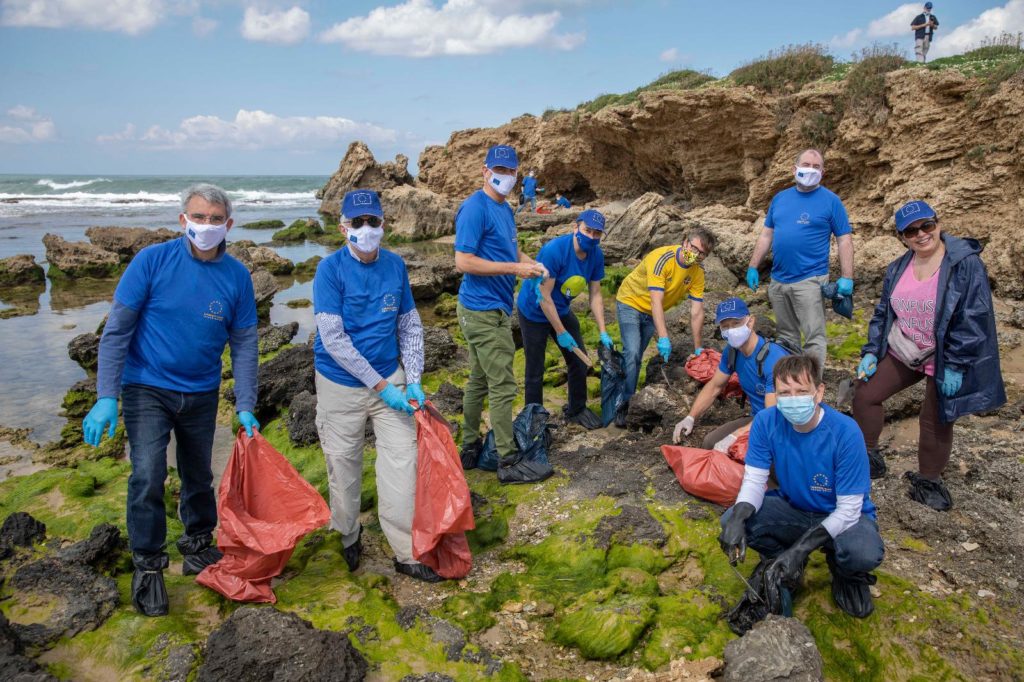Two weeks after an oil spill in the Eastern Mediterranean Sea polluted the beaches of Israel and southern Lebanon and led to the worst ecological disaster in decades the mysteries surrounding the pollution are in the process of being resolved.
On Wednesday, the Israeli ministry of environmental protection disclosed that the ship that had caused the pollution had been identified. According to ministry, the ship was a Libyan tanker, Emerald, registered in the Marshall Islands, which had been smuggling oil from Iran to Syria.
After exciting the Suez Canal, it deactivated its tracking system, entered Israeli territorial waters and continued to international water between Cyprus and Syria, where it carried out a dangerous ship-to-ship (STS) transfer operation of crude oil to an Iranian tanker, Lotus, heading to Syria. After the oil transfer it returned to Iran.
Yesterday, the ministry published a time-line on its website about the Emerald’s voyage from Iran to the Mediterranean Sea, based on satellite images from TankerTrackers, a company that uses satellite images and maritime data to track shipments and storage of crude oil.
While admitting that the evidence was not forensic, and without consulting Israel’s intelligence agencies, the Israeli Environmental Protection Minister accused Iran of environmental terrorism. The Israeli chapter of Greenpeace said that her statement was political and that the only way to determine from where the leak came from was through laboratory tests.
Cooperation with EU agency
Another mystery was the functioning of the communication channels between the European Maritime Safety Agency (EMSA) and the Israeli ministry. Israel claimed that EMSA as a party to the Barcelona Convention, which all Mediterranean countries, EU and non-EU countries, have signed, should have notified it in real time about maritime pollution events.
However, Commission sources told The Brussels Times that EMSA as an EU Agency, which is governed by EU Law, is above all driven by the cooperation among EU member states. The Barcelona convention is signed among states. EMSA is not a state and thus not a contracting party but supports the work of the European Commission.
EMSA does offer limited access to third countries for some of its monitoring tools, but this needs to be encoded in appropriate agreements and controlled for. For the detection of oil spills, the relevant service is the so-called “CleanSeaNet” (CSN), which routinely monitors European waters for suspect oil spills.
An adapted version of CSN may be made available to third countries, however only on the condition that the “Condition of Use” has been signed by both parties. This is a possibility under the framework “SAFEMED IV” project, where all beneficiaries including Israel were given the opportunity to do so. However, Israel has not yet signed it. This means information available for sharing by EMSA is limited.
Anti-EU rhetoric’s aside, it is not clear why Israel until now has not become a full partner of the project. Following the ecological disaster, which took Israel by surprise, it appears that its ministry of foreign affairs will have to step in to complete the necessary procedure to join CleanSeaNet in the near future, which would allow for better information sharing.
EU clean-up operation
On the positive side, Emanuele Giaufret, the EU ambassador to Israel, was joined on Friday morning by 10 ambassadors from EU member states at a large-scale beach clean-up operation at the Beit Yanai National Park near Netanya.
The ambassadors represented Ireland, the Netherlands, Sweden, Italy, Belgium, Hungary, Spain, Cyprus, Bulgaria and Romania. Other participating countries were Croatia, Estonia, Finland and France. Clad in blue EU t-shirts and wearing plastic bags on their shoes, the diplomats removed tar from stones along the coastline.
“As soon as we saw the terrible images of black tar washed up on beaches along the coastline, we decided that we had to do something to help,” Ambassador Giaufret said. “Every summer our delegation organizes a massive beach clean-up, but this disaster calls for immediate action.”
Protecting the environment is one of the EU’s top priorities, he added. The EU puts a strong emphasis in its activities around the world, including in Israel, on preserving and cleaning beaches from waste, and the severe incident that has contaminated Israel's beaches in recent days is another, especially painful, reminder of the importance of these efforts.
M. Apelblat
The Brussels Times

